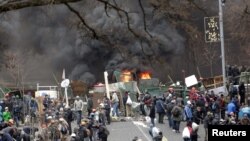PARIS —
The European Union has agreed to impose sanctions against Ukraine, including visa bans and asset freezes targeting those believed responsible for the country's worst violence in years.
The details are still sketchy about just who will be targeted by the European Union sanctions, but the list will be drawn up in a matter of days. EU foreign ministers meeting in Brussels say the sanctions will include visa bans and asset freezes against those responsible for the violence. EU foreign policy chief Catherine Ashton said the 28-member bloc will also suspend export licenses for equipment like anti-riot gear that can be used for internal repression.
"It's absolutely clear that this violence is completely unacceptable and should stop immediately. Any further escalation should be avoided. Those who are responsible for human rights violations should be brought to justice," said Ashton.
The sanctions will also depend on progress in finding a political solution to the standoff between the government and opposition in Kyiv. The foreign ministers of France, Germany and Poland are currently in Ukraine, holding talks with both sides during a new bout of violence. Clashes in recent days have reportedly killed several dozen people and injured hundreds more.
Ashton said President Viktor Yanukovych and his government are primarily responsible for restoring order and getting the political process going.
"It's the first job of any government to keep your people safe. And if they're not safe, they need to act to ensure they are," she said.
The EU decision follows an announcement by the United States that it had imposed a visa ban on 20 senior Ukrainian officials. British Foreign Secretary William Hague said Europe's sanctions will not be identical, but he predicted some overlap.
"It is a strong signal of how unacceptable this is and it should be unacceptable in any city or country in the world…and it's a signal of the EU's determination to do something about it," said Hague.
Despite the sanctions, the EU has left the door open for political dialogue - and for an association agreement with Ukraine in the long term. Mr. Yanukovych's U-turn on the deal leading to closer political and economic ties with the EU helped spark the current unrest.
EU decides as a matter of urgency on asset freeze and visa ban on those responsible for violence and excessive force in Kiev.
The details are still sketchy about just who will be targeted by the European Union sanctions, but the list will be drawn up in a matter of days. EU foreign ministers meeting in Brussels say the sanctions will include visa bans and asset freezes against those responsible for the violence. EU foreign policy chief Catherine Ashton said the 28-member bloc will also suspend export licenses for equipment like anti-riot gear that can be used for internal repression.
"It's absolutely clear that this violence is completely unacceptable and should stop immediately. Any further escalation should be avoided. Those who are responsible for human rights violations should be brought to justice," said Ashton.
The sanctions will also depend on progress in finding a political solution to the standoff between the government and opposition in Kyiv. The foreign ministers of France, Germany and Poland are currently in Ukraine, holding talks with both sides during a new bout of violence. Clashes in recent days have reportedly killed several dozen people and injured hundreds more.
Ashton said President Viktor Yanukovych and his government are primarily responsible for restoring order and getting the political process going.
"It's the first job of any government to keep your people safe. And if they're not safe, they need to act to ensure they are," she said.
The EU decision follows an announcement by the United States that it had imposed a visa ban on 20 senior Ukrainian officials. British Foreign Secretary William Hague said Europe's sanctions will not be identical, but he predicted some overlap.
"It is a strong signal of how unacceptable this is and it should be unacceptable in any city or country in the world…and it's a signal of the EU's determination to do something about it," said Hague.
Despite the sanctions, the EU has left the door open for political dialogue - and for an association agreement with Ukraine in the long term. Mr. Yanukovych's U-turn on the deal leading to closer political and economic ties with the EU helped spark the current unrest.
EU decides as a matter of urgency on asset freeze and visa ban on those responsible for violence and excessive force in Kiev.
— Carl Bildt (@carlbildt) February 20, 2014




